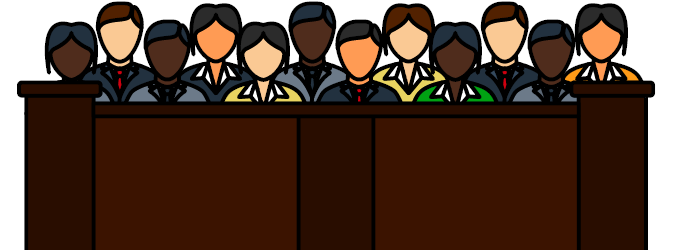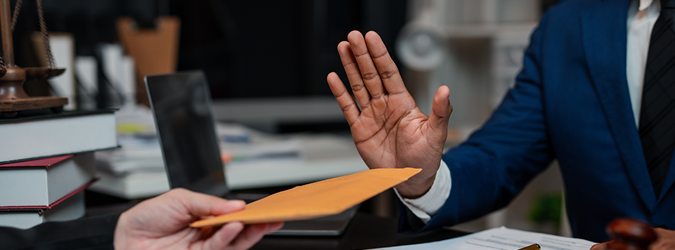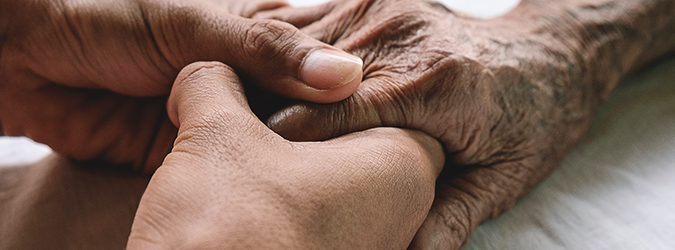Balancing Juror Security With the Right to a Fair Trial
6.7.2024

In this age of instant access to all forms of information and the resulting personal security concerns, courts are called upon to balance the privacy rights of citizens constitutionally called to duty as jurors in a criminal case against the right of fellow citizens to invade their privacy under the Constitution and common law.[1]
In 2018, I represented the president of a national motorcycle gang, who was accused of orchestrating the assassination of two disloyal members. Rough-looking supporters of the defendants and even rival gang members sat in the courtroom every day. Jurors who lived an excessive distance from the courthouse could voluntarily choose to be put up at an undisclosed local hotel at any time during the trial. One day during the months-long case, we learned a juror had notified the court that a man had approached the front desk clerk at his hotel asking for his room number. The juror was shaken up, believing that possibly one of the defendants or their associates had followed him. After the U.S. Marshals pulled the video from the hotel, the juror was relieved to learn his wife had told his best friend where he was staying, and the friend had stopped by to visit on his way through town.
Due to the extensive media coverage in that case, we moved for a change of vicinage – i.e., to have the trial in another part of the judicial district (as opposed to a change of venue, which involves transferring the case to a different district altogether). The burden on defendants to show that they can’t receive a fair trial due to pretrial publicity is very high. As one state court judge in Arizona recently put it, those motions are rarely requested and even more rarely granted.[2]
While I have never been told in my 30 years of practice that a juror on any of my criminal trials has been physically threatened or harassed, some have certainly been subjected to nasty comments on social media, criticized in the newspaper and even disparaged by public officials.
In these divisive political times when judges are under attack, and some have even had family members killed, everyone in the criminal justice system can sympathize with the trepidation jurors may feel when called to serve. Aside from anxiety about deciding the fate of the famous or infamous, some jurors may be equally afraid of the public’s response. They may be wary of what unstable people may do, like the man who lit himself on fire across the street from the courthouse as jury selection in one of former President Donald Trump’s cases was ending.
Balancing Juror Security With Constitutional Rights
In the high-profile trial of NXIVM sex cult leader Keith Raniere, the federal court recognized the “presumption of openness” that attaches to judicial proceedings. However, it also acknowledged that the public’s interest in the proceedings must sometimes yield to other rights, such as protecting the privacy of jurors.[3]
Criminal trials, including voir dire of potential jurors, have historically been open to the public. Invasions of juror privacy traditionally have been thought of as an acceptable counterbalance to a defendant’s Sixth and 14th Amendment rights to a fair trial and impartial jury and the press and public’s First Amendment right to observe the trial. However, some studies have shown that 25-30% of all potential jurors withhold material information. They do so partly because of a reluctance to disclose sensitive or personal details, because they do not understand the parties’ need to know, fear or embarrassment, or their misunderstanding of how else the courts might seek to use the information.[4] In other words, by “infringing on juror privacy, the justice system causes more jurors to lie and to withhold material information revealing their true biases, thus undermining the accused’s constitutional rights.”[5]
Evolving technology has made it harder to ensure and protect jurors’ privacy and security. In 1991, Court TV launched as a paid television service that covers “the nation’s most important and compelling trials.”[6] This was the environment in which federal Judge I. Leo Glasser presided over the trial of mob boss John Gotti. In an effort to protect jurors’ safety and privacy, it was the first, and still the only, case in the Brooklyn federal courthouse to have a fully anonymous and sequestered jury.[7] The challenges for jurors seated in cases that receive extraordinary public attention were noted by Judge Glasser: “Jurors in any case make a personal sacrifice. . . . They are removed from their families and jobs and are unable to share their experiences with anyone, until their obligations at the courthouse have been fulfilled.”[8]
Similarly, the judge presiding over the 1992 trial of former New York Senate Majority Leader Joseph L. Bruno remarked that he had “inherited a controversial prosecution, a statewide media frenzy, and the impending need to impanel an impartial jury.”[9] He described the court’s efforts to alleviate juror concerns as designed to “acknowledge the fundamental reality of modern life: personal privacy is a shrinking domain in need of robust safeguards.”[10]
In January 2009, two years after the first iPhone was released, the challenges Judge Glasser had identified 15 years earlier had become more complex. Technological advancements and the development of mainstream audiences that craved 24/7 reality infotainment led to a broader audience with an interest in, and access to, court proceedings. More public attention meant jurors were more scrutinized and potentially subjected to more serious threats, leading to higher levels of juror anxiety. It continues to this day.
People of New York State v. Trump
The recent case against former President Trump in New York has put a spotlight on juror security as the judge attempted to balance Trump’s rights with the need to maintain juror privacy. Trump’s constant posting about the case in the run-up to the trial, targeted campaigns online and 24/7 media coverage raised myriad security concerns, including protecting jurors. As a preventative measure, the judge ruled that “the jurors, who could face threats to their privacy and safety, should remain anonymous, though lawyers for both sides will know their names and addresses.”[11]
However, courtroom reporters were live-blogging the profiles of prospective jurors, including physical descriptions, recent employment, jurors’ preferred news outlets and where in Manhattan they live.[12] One juror who was already sworn and seated had to be dismissed after she told the court she was afraid to serve. She was concerned her identity might be revealed in the public media storm and thought her anxiety about it might affect her ability to be fair.[13]
Some experts have argued that technology can simultaneously exacerbate juror stress and enhance their experience,[14] but empirical research is lacking. One thing is certain – there’s no turning back from the use of technology in the court system. New York’s appellate courts offer live online streaming of most proceedings before them. Some states have encouraged courts to create YouTube channels for the purpose of streaming proceedings and collecting them in an online directory. One of these states, Texas, is the recommended model for the Unified Court System in New York as it considers a pilot program for the online streaming of trial-level court proceedings.
On June 17, 2020, former Chief Judge Janet DiFiore created the Commission to Reimagine the Future of New York’s Courts, which was charged with the purpose of improving “the delivery and quality of justice services, facilitate access to justice, and better equip the New York State [courts] to keep pace with society’s rapidly evolving changes and challenges.”[15] While the purpose of the commission is laudable, not a single page of its 44-page report mentions a concern with protecting juror privacy or the effect the advent of new technology may have on jurors.[16]
Responding to the Challenge
Courts have addressed the concerns about the increasing exposure of jurors in a variety of ways. Juror questionnaires, for example, permit jurors to respond to questions in writing, thus avoiding the discomfort of explicitly revealing sensitive information before a large group of strangers in the courtroom or by indicating a desire to approach the bench, which might give the impression the juror has something to hide.
The remedy also often depends on the particular circumstances of the case. In United States v. Rosario,[17] a gun and drug trafficking case, the court found that the jurors’ right to privacy outweighed the public’s right to access unredacted transcripts of jury selection. The court ordered the sealing of voir dire transcripts so that the “names, addresses, employers, and occupations of all jurors and their family members” would be redacted from the public docket. This balance was narrowly tailored to preserve juror privacy without impinging on the defendant’s rights.
The court in Trump’s case used questionnaires that the commissioner of jurors sent to prospective jurors to pre-screen the pool and excuse those who could not serve for various legal reasons. The qualifying questionnaires were sent to 500 potential jurors. Of those, 96 people were summoned to the courthouse for the first day of jury selection. About two-thirds of that group raised their hands when the judge asked early on if there was any reason they did not think they could be fair. The judge decided not to engage in the usual process of individual questioning in order to try to rehabilitate them. Instead, he took them at their word and dismissed them en masse. The judge likely anticipated some of those summoned might feel anxious and not want to serve. In a high-profile case such as this one, the pressure on jurors is magnified: intrusions on their privacy, worries about their safety (as some of the remaining jurors said later in the selection process), hesitancy to honestly express strong personal or political beliefs, reluctance to admit they had formed opinions about the defendant’s guilt because of what they already knew about the case, and worries about missing work or the stress on their family. They would have had to disclose that kind of private information in a crowded courtroom. They certainly may have felt intimidated speaking publicly in front of reporters or the powerful friends of the ex-president, who is well-known for using the media and other means to attack people who cross him.
Sometimes judges will question jurors one at a time at the bench to protect their privacy, but because of the number of people who raised their hands in the Trump case, it would have caused significant delay. Having that many people in the courtroom for a prolonged period makes dealing with security issues more complicated. Having overflow rooms for all the extra media personnel, crowd control for demonstrations, providing security for the former president and sweeping the courtroom for bombs or weapons are logistical challenges. In addition, an overt law enforcement presence, while necessary, can itself contribute to juror unease about real or perceived threats.
Despite the unprecedented nature of the trial, the intense media presence, and the expression of anxiety by several of the potential jurors, the parties were able to seat the jury in just three days.
What Can a Judge Do? Precautions To Ensure Juror Safety
The rise in politically motivated violence in recent years has required courts to now routinely take precautions to ensure juror safety inside and outside the courthouse. In addition to standard practices such as cautioning jurors not to talk to anyone about the case and to report anyone who attempts to contact them, some of these are:
- Start by telling jurors that the court prioritizes their safety and privacy and explain how jurors can convey their concerns to the judge so they can be addressed.
- Sequester jurors at hotels whose locations are kept secret and transport them to and from the courthouse in varying types of vehicles from different pickup locations.
- “Partial sequestration”: Allow jurors the option to sleep at home on down days but remain at a hotel on the days the trial is in session.
- Use “anonymous” juries where names, addresses and identifiers are not revealed to the public or even the parties.[18] Even making names and cities or towns where jurors live secret is no longer adequate protection, because jurors can be easily located on the internet.
- Some states limit the type of information lawyers can obtain. For example, in Washington State, juror questionnaires differentiate between information collected for the purpose of juror qualification, jury administration and voir dire and provide a means for jurors to respond privately to sensitive questions.
- After a verdict, especially where there is anticipated media contact, judges meet withjurors and explain their privacy rights and inform them that they are no longer bound by restrictions on outside contact and that the decision to speak is strictly a matter of individual choice.
- Jurors should be informed they have the continuing protection of the court in the event that individuals or the media persist in questioning the jurors over their objection about their jury service.[19]
- In addition to preventative security, some courts have offered free counseling to jurors exposed to traumatic images or testimony. Jurors in the trial of mass murderer Dylan Roof in South Carolina were offered counseling after the trial ended.[20]
In 2020, a federal judiciary committee issued a new set of model jury instructions to deter jurors from using social media to research or communicate about cases.[21] The Guide to Judiciary Policy from the Administrative Office of the U.S. Courts directs court reporters to redact juror identities from trial transcripts and directs judges to “make efforts to limit references on the record to potential jurors’ names by assigning and using numbers for each juror” during voir dire proceedings.[22] Pursuant to 28 U.S.C. § 1863(b)(7), names and personal information concerning petit and grand jurors are not disclosed to attorneys, parties, the public or the media, except in open court or upon order of the court. The court may order the names and personal information kept confidential in the interest of justice; 28 U.S.C. § 1867(f) (criminalizing the unauthorized disclosure of juror information); Federal Rule of Criminal Procedure 49.1 providing for redaction where a filing contains an individual’s Social Security number, birth date or home address; or New York Judiciary Law § 509(a) requiring juror “questionnaires and records shall be considered confidential and shall not be disclosed except to the county jury board or as permitted by the appellate division.”
In my own practice, I have recommended to my clients accused of violent crimes that they refrain from taking notes, because jurors get jittery when they think defendants, especially those accused of extreme violence, are writing down their personal information.
While these steps do address jurors’ concerns about their safety, stronger measures are needed in the face of today’s world where active shooters and internet trolls can readily identify and target their victims. Yet juror safety has not received the same attention as security for witnesses, judges and court personnel. The need for strong security measures for witnesses was addressed long ago with the witness protection program, and rising incidents of court violence have now prompted Congress to weigh the Countering Threats and Attacks on Our Judges Act, which would establish a State Judicial Threat Intelligence and Resource Center that would monitor threats to state and local judges, assess physical security measures and coordinate research on best security practices for all court personnel.
Jurors’ concern for their safety can affect their ability to remain neutral. When their safety concerns are addressed – equal to that for witnesses, judges and court personnel – then the justice system will be strengthened as well.
Cheryl Meyers Buth is founder and partner of the Meyers Buth Law Group in Orchard Park, New York, where she practices criminal defense and civil litigation as well as sports and entertainment law. She is a regular commentator in the local Buffalo-area news as part of her mission to encourage other women into the field of law. In 2017, she was honored with the Charles F. Crimi Award, given by NYSBA’s Criminal Justice Section to honor the career of a defense lawyer in private practice.
[1] See U.S. Const. art. III, § 2, cl. 3 (“The Trial of all Crimes … shall be by Jury ….”); U.S. Const. amend. VI (“In all criminal prosecutions, the accused shall enjoy the right to a speedy and public trial, by an impartial jury of the State and district wherein the crime shall have been committed ….”).” United States v. Bruno, 700 F. Supp. 2d 175, 181 (N.D.N.Y 2010).
[2] Bianca Buono, Does Social Media Have an Impact on Juries? A Maricopa County Judge Says Yes, 12News, April 15, 2024, https://www.12news.com/article/news/local/valley/maricopa-county-judge-social-media-juries/75-cfd77894-91a4-46a2-ae1f-f6caddd83dd5.
[3] United States v. Raniere, 2019 U.S. Dist. LEXIS 110735, *3-6 (E.D.N.Y. July 2, 2019); see also ABC, Inc. v. Stewart, 360 F.3d 90, 98 (2d Cir. 2004) (quoting Waller v. Georgia, 467 U.S. 39, 45 (1984), citing Press-Enter. Co. v. Superior Court of California, Riverside Cty., 464 U.S. 501, 510 (1984)).
[4] See Paula L. Hannaford, Safeguarding Juror Privacy: A New Framework for Court Policies and Procedures, National Center for State Courts, Judicature, vol. 85, no. 1, July-Aug. 2001, https://www.ncsc-jurystudies.org/__data/assets/pdf_file/0021/7086/safeguarding-juror-privacy.pdf.
[5] Melanie D. Wilson, Juror Privacy in the Sixth Amendment Balance, University of Tennessee College of Law, 2012 (arguing juror privacy is a necessary complement to a defendant’s rights).
[6] About Us, Court TV, https://www.courttv.com/about-us/.
[7] How Courts Care for Jurors in High Profile Cases, U.S. Courts, Jan. 24, 2020, www.uscourts.gov/news/2020/01/24/how-courts-care-jurors-high-profile-cases.
[8] Quoted in How Courts Care for Jurors in High Profile Cases, supra note 7.
[9] United States v. Bruno, 700 F. Supp. 2d 175, 180.
[10] Id.
[11] Jonah E. Bromwich, Ben Protess, Maggie Haberman and Kate Christobek, Prospective Jurors Are Dismissed by Dozens as Trump’s Trial Begins, The New York Times, April 15, 2024.
[12] Kate Christobek and Wesley Parnell, Meet the 12 Manhattan Jurors Who Will Decide Donald J. Trump’s Fate, The New York Times, April 18, 2024; Erin Doherty, Trump Jurors Face MAGA’s Microscope, AXIOS, April 18, 2024.
[13] Ben Protess and Jonah E. Bromwich, What We Know About Why Two Trump Jurors Were Dismissed, The New York Times, April 18, 2024.
[14] Sarah A. Trescher, Monica K. Miller, and Brian H. Bornstein, How Does Jury Service Affect 21st-Century Jurors? A Call to Action for Researchers, Criminal Juries in the 21st Century: Psychological Science and the Law, Cynthia Najdowski and Margaret Stevenson (ed.), Oxford Univ. Press, 2018; see also COSCA [Conference of State Court Administrators] Issues Call to Action for Improved Treatment of Jurors, National Center for State Courts, Jan. 16, 2024 (COSCA identifies four causes of juror stress: (1) uncertainty, lack of control and long wait times; (2) the cost of jury service; (3) privacy concerns and fears about personal and family safety; and (4) post-trial anxiety, guilt and vicarious trauma.
[15] Press Release, Chief Judge DiFiore Names Commission To Develop Comprehensive Vision for the Court System of the Future, N.Y. Courts, June 17, 2020, http://www.nycourts.gov/LegacyPDFS/press/PDFs/PR20_28.pdf.
[16] Report and Recommendations of the Future Trials Working Group, N.Y. Courts, April 2021, https://www.nycourts.gov/whatsnew/pdf/future-trials-working-grp-april2021.pdf.
[17] 2019 U.S. Dist. LEXIS 9519, *3 (D. Ct. July 18, 2019).
[18] See United States v. Vario, 943 F.2d 236, 239 (2d Cir. 1991) (anonymous juries do not infringe a defendant’s constitutional rights if the jury needs protection and reasonable precautions are taken to minimize the effect that the decision will have on the jurors’ opinions of the defendant) (collecting cases).
[19] The jurors’ right to privacy in their answers may not be absolute. For example, in In Re Access to Juror Questionnaires; The Washington Post, (D.C. Court of Appeals, 2012), the Washington Post sought juror questionnaires in the murder trial of the individual accused of murdering Chandra Levy in 2001. At the time, the press reported that Levy was having an affair with Congressman Gary Condit, so the trial received intense media coverage. Initially jurors were told their answers to a questionnaire would be kept confidential. However, the court of appeals subsequently ordered the public had a right to access all but the most “deeply personal matters.”
[20] The service in federal court is available through the Federal Occupational Health Employee Assistance program and is confidential and voluntary.
[21] See New Jury Instructions Strengthen Social Media Cautions, U.S. Courts, Oct. 1, 2020, https://www.uscourts.gov/news/2020/10/01/new-jury-instructions-strengthen-social-media-cautions.
[22] See 10 Admin. Office of U.S. Courts, Guide to Judiciary Policy §§ 330.10.10, 330.20(c)(2)(A)(ii) (2016).






